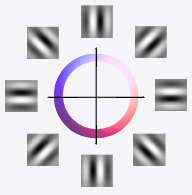Sanborn, S., Miolane, N.
Abstract
We introduce a general method for achieving robust group-invariance in group-equivariant convolutional neural networks (G-CNNs), which we call the G-triple-correlation (G-TC) layer. The approach leverages the theory of the triple-correlation on groups, which is the unique, lowest-degree polynomial invariant map that is also complete. Many commonly used invariant maps--such as the max--are incomplete: they remove both group and signal structure. A complete invariant, by contrast, removes only the variation due to the actions of the group, while preserving all information about the structure of the signal. The completeness of the triple correlation endows the G-TC layer with strong robustness, which can be observed in its resistance to invariance-based adversarial attacks. In addition, we observe that it yields measurable improvements in classification accuracy over standard Max G-Pooling in G-CNN architectures. We provide a general and efficient implementation of the method for any discretized group, which requires only a table defining the group's product structure. We demonstrate the benefits of this method for G-CNNs defined on both commutative and non-commutative groups--SO(2), O(2), SO(3), and O(3) (discretized as the cyclic C8, dihedral D16, chiral octahedral O and full octahedral Oh groups)--acting on ℝ2 and ℝ3 on both G-MNIST and G-ModelNet10 datasets.
Citation
Sanborn, S., & Miolane, N. (2023). A general framework for robust g-invariance in g-equivariant networks. Advances in Neural Information Processing Systems, 36, 67103-67124.
BibTeX
@article{sanborn2023general,
title={A general framework for robust g-invariance in g-equivariant networks},
author={Sanborn and Miolane},
journal={Advances in Neural Information Processing Systems},
volume={36},
pages={67103--67124},
year={2023}
}
